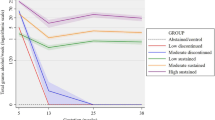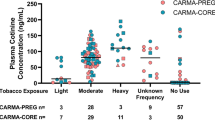Abstract
Objective:
To study if pregnant women give the same answers to questions on frequency and timing of binge drinking when asked more than once during and after pregnancy.
Design:
Cohort study.
Setting:
The Danish National Birth Cohort.
Subjects:
The study is based on 76 307 pregnant women with repeated information on binge drinking during the early part of pregnancy and 8933 pregnant women with information on binge drinking during pregnancy weeks 30–36, obtained while pregnant and 6 months after delivery.
Results:
More women reported binge drinking, if the interview took place close to the period in question. As the report of binge drinking was highest in the first of two interviews referring to the same period, as well as women who participated in the first interview in pregnancy week 12 or earlier reported more binge drinking compared to women who participated in the interview later in pregnancy.
Conclusions:
Self-reported information on binge drinking is more frequently under-reported when the recall period is long. To improve the validity of data on binge drinking, future birth cohorts should obtain information several times during pregnancy.
Sponsorship:
The Danish National Board of Health and the Health Insurance Foundation.
This is a preview of subscription content, access via your institution
Access options
Subscribe to this journal
Receive 12 print issues and online access
$259.00 per year
only $21.58 per issue
Buy this article
- Purchase on Springer Link
- Instant access to full article PDF
Prices may be subject to local taxes which are calculated during checkout


Similar content being viewed by others
References
Allebeck P, Olsen J (1998). Alcohol and fetal damage. Alcohol Clin Exp Res 22, 329–332.
Bonthius DJ, Goodlett CR, West JR (1988). Blood alcohol concentration and severity of microencephaly in neonatal rats depend on the pattern of alcohol administration. Alcohol 5, 209–214.
Cicchetti DV, Feinstein AR (1990). High agreement but low kappa: II. Resolving the paradoxes. J Clin Epidemiol 43, 551–558.
Ekholm O (2004). Influence of the recall period on self-reported alcohol intake. Eur J Clin Nutr 58, 60–63.
Goodlett CR, Eilers AT (1997). Alcohol-induced Purkinje cell loss with a single binge exposure in neonatal rats: a stereological study of temporal windows of vulnerability. Alcohol Clin Exp Res 21, 738–744.
Iyasu S, Randall LL, Welty TK, Hsia J, Kinney HC, Mandell F et al. (2002). Risk factors for sudden infant death syndrome among northern plains Indians. JAMA 288, 2717–2723.
Kesmodel U (2001). Binge drinking in pregnancy – frequency and methodology. Am J Epidemiol 154, 777–782.
Kesmodel U, Frydenberg M (2004). Binge drinking during pregnancy – is it possible to obtain valid information on a weekly basis? Am J Epidemiol 159, 803–808.
Kesmodel U, Olsen SF (2001). Self reported alcohol intake in pregnancy: comparison between four methods. J Epidemiol Community Health 55, 738–745.
Nybo Andersen AM, Olsen J (2002). Do interviewers' health beliefs and habits modify responses to sensitive questions? A study using data collected from pregnant women by means of computer-assisted telephone interviews. Am J Epidemiol 155, 95–100.
Olsen J (1994). Effects of moderate alcohol consumption during pregnancy on child development at 18 and 42 months. Alcohol Clin Exp Res 18, 1109–1113.
Olsen J, Melbye M, Olsen SF, Sorensen TI, Aaby P, Andersen AM et al. (2001). The Danish National Birth Cohort – its background, structure and aim. Scand J Public Health 29, 300–307.
Olsen J, Tuntiseranee P (1995). Is moderate alcohol intake in pregnancy associated with the craniofacial features related to the fetal alcohol syndrome? Scand J Soc Med 23, 156–161.
Pascoe JM, Kokotailo PK, Broekhuizen FF (1995). Correlates of multigravida women's binge drinking during pregnancy. A longitudinal study. Arch Pediatr Adolesc Med 149, 1325–1329.
Passaro KT, Little RE, Savitz DA, Noss J (1996). The effect of maternal drinking before conception and in early pregnancy on infant birthweight. The ALSPAC Study Team. Avon Longitudinal Study of Pregnancy and Childhood. Epidemiology 7, 377–383.
Pierce DR, West JR (1986). Blood alcohol concentration: a critical factor for producing fetal alcohol effects. Alcohol 3, 269–272.
Svensson E (1997). A coefficient of agreement adjusted for bias in paired ordered categorical data. Biometrical J 39, 643–657.
Svensson E (1998). Apllication of a rank-invariant method to evaluate reliability of ordered categorical assesments. J Epidemiol Biostat 3, 403–409.
Tolo KA, Little RE (1993). Occasional binges by moderate drinkers: implications for birth outcomes. Epidemiology 4, 415–420.
West JR, Goodlett CR, Bonthius DJ, Hamre KM, Marcussen BL (1990). Cell population depletion associated with fetal alcohol brain damage: mechanisms of BAC-dependent cell loss. Alcohol Clin Exp Res 14, 813–818.
Whitehead N, Lipscomb L (2003). Patterns of alcohol use before and during pregnancy and the risk of small-for-gestational-age birth. Am J Epidemiol 158, 654–662.
Acknowledgements
This particular study is funded by grants from the Danish National Board of Health and the Health Insurance Foundation. The Danish National Research Foundation has established the Danish Epidemiology Science Centre that initiated and created the Danish National Birth Cohort. The cohort is furthermore a result of a major grant from this foundation. Additional support for the Danish National Birth Cohort is obtained from the Pharmacy Foundation, the Egmont Foundation, the March of Dimes Birth Defects Foundation and the Augustinus Foundation.
Author information
Authors and Affiliations
Corresponding author
Additional information
Guarantor: K Strandberg-Larsen.
Contributors: KS-L contributed to the conception and design of the study, analysis and interpretation of data, and drafting the paper. A-MNA, JO, NRN, and MG contributed to the conception and design of the study and to critically revising the manuscript. A-MNA and JO contributed to the design of the Danish National Birth Cohort and acquisition of data. A-MNA, JO and MG have designed the questions on number and timing of binge drinking used in the present study. All contributors have approved the final version of the manuscript.
Rights and permissions
About this article
Cite this article
Strandberg-Larsen, K., Andersen, AM., Olsen, J. et al. Do women give the same information on binge drinking during pregnancy when asked repeatedly?. Eur J Clin Nutr 60, 1294–1298 (2006). https://doi.org/10.1038/sj.ejcn.1602451
Received:
Revised:
Accepted:
Published:
Issue Date:
DOI: https://doi.org/10.1038/sj.ejcn.1602451
Keywords
This article is cited by
-
Characteristic associated with alcohol drinking in early pregnancy: a cross sectional study
Scientific Reports (2023)
-
Comparison of assessment methods for self-reported alcohol consumption in health interview surveys
European Journal of Clinical Nutrition (2008)
-
Characteristics of women who binge drink before and after they become aware of their pregnancy
European Journal of Epidemiology (2008)



